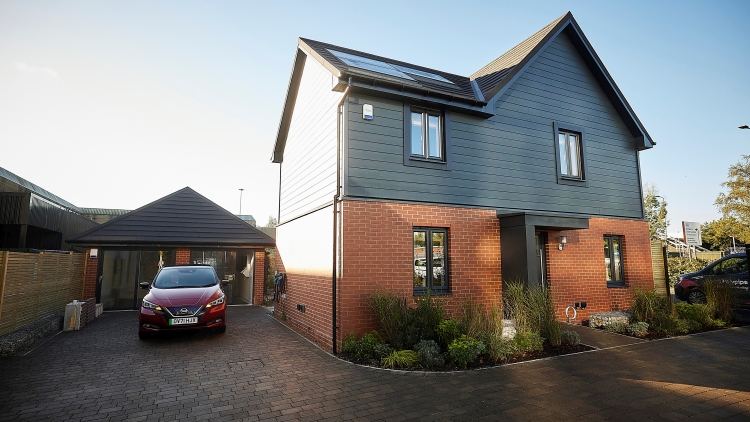
Housebuilder Barratt has built a zero-carbon ‘house of the future’ that will be occupied and monitored by academics before the results are shared with the industry.
Barratt’s Z House has been built at the University of Salford incorporates modern construction methods such as such as closed-panel timber frames with highly insulated cladding, factory fitted windows and offsite panelised masonry ground floor wall panels. It also includes an air source heat pump, EV charging points, PV solar panels and battery storage.
Overhead infrared panels will provide zero-carbon heat, while the home is also fitted with new air-powered showers, as well as plaster which eliminates pollutants, a fridge which keeps the right humidity resulting in 60% less food wastage, smart electricity sockets that allow appliances to be controlled remotely, and innovative heated skirting boards delivering 10% more heat than traditional radiators while also saving space.
There will also be a knowledge and energy hub built into the garage space to showcase products and technologies used within the Z House. Here, visitors to the house will be able to monitor digital displays showing visuals of live energy use via a monitoring network which is built into the fabric of the home.
Barratt claims the house delivers a carbon reduction of 100% against the 2013 Part L Building Regulations, while the smart technology contained within it would allow occupants to achieve an extra 25% reduction in emissions from unregulated energy that is linked to customer lifestyles such as the use of fridges, TVs and other appliances.
Last year, Barratt announced that all of its new homes will be zero carbon by 2030 and this flagship concept house, based on the popular Barratt ‘Alderney’ housetype, is its first step in achieving that.
The new home has been built with over 40 industry partners from across the housebuilding, sustainability and technology sectors including, GTC, British Gypsum, Octopus, Nissan and Mitsubishi.
Professor Will Swan, director of Energy House Laboratories at The University of Salford said: “We are pleased to be working with Barratt Developments and their partners on the Z House and continue to expand the University’s ground breaking research and innovation into low carbon technologies within the built environment sector. Our leading Energy House Laboratories are in close proximity to the house and will play a pivotal role in exploring the energy performance of this industry-first home making a vital contribution to the future of housebuilding in the UK.”
David Thomas, chief executive of Barratt Developments, said: “We want to showcase what can be done to deliver zero carbon living using the latest technologies and working with the best industry partners. Ultimately, the aim is to find solutions to enable the industry to build high quality, zero carbon homes that customers love, at scale. We can then share this knowledge to help the industry deliver the future of sustainable housing.”
Outside of the Z House there will be a biodiversity garden featuring nests for bats and swifts, a wildlife pond, hedgehog highways and green wall.
Comments
Comments are closed.











Nice to see this, but CM must start to distinguish between Operational Carbon Emissions (which I believe this article is referring too) and Whole Life Carbon Emissions (which include the embodied carbon in the materials used). We need to ensure both achieve a net-zero balance if we are to hit our 2050 Carbon commitments!
Costs?
I am not convinced of the effectiveness and efficiency of air source heat pumps in practice. Possibly more efficient/ cost effective when used with underfloor heating
Good to trial these systems and feedback in use very important
Any innovations must be simple to use – The average user may be app/ smartphone
competent but will not be a scientist…
We need to educate our children about eco living
Stay safe/well all
John Clinch mciat
As usual, not a word about the inevitable and not insignificant ’embodied cost’! Until this subject ceases to be an abstract concept divorced from the real world, the economic realities of ‘Zero Carbon’ will, sooner rather than later, come as a terrible shock to its acolytes.